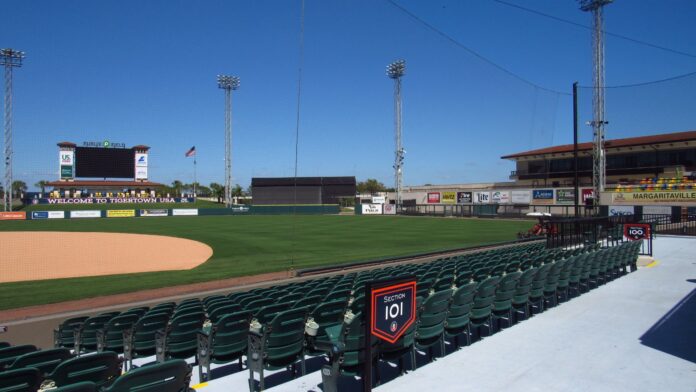
Emma Poole
Staff Writer
Since the 1920s, Lakeland has been closely tied to baseball, but the current MLB lockout is threatening the presence of the Detroit Tigers in the city that they have called their spring training site for over 85 years.
From the origins of training at historic Henley Field, which is now owned by Florida Southern College, to the Tigers’ current home at Publix-Marchant stadium, baseball has grown with the city of Lakeland. According to the MLB, the Covid-19 pandemic kept games from operating at full capacity last year, and now the lockout is presenting another roadblock to baseball.
Rachel Carter, a Florida Southern student and former intern at Publix-Marchant stadium, believes that not only would the lockout impact the spring training season, it would also impact the Tigers’ regular season as well.
“Not being able to train would impact the Tigers’ performance in the regular season,” Carter said, “And people get upset about this, too. People enjoy their baseball.”
Here’s a timeline of the lockout and what it could mean for the Tigers, as well as the city of Lakeland.
Dec. 2, 2021 marked the beginning of what would turn into the second longest work stoppage in MLB history. The longest was the 1994 strike, which, according to NBC, cost the sport 938 games, including the entirety of the postseason.
The 2021 lockout began when owners and players failed to come to terms on a new Collective Bargaining Agreement (CBA), which is the employment rules and financial structure of the sport, as the old one expired on Dec. 1. What is unique about this lockout is that it was imposed by the owners, who are not letting their players report.
According to the Sports Illustrated website, originally, baseball commissioner Rob Manfred intended for the lockout to expedite negotiations between owners and the MLBPA.
However, the league waited until Jan. 13 to make their first proposal for the new CBA – that’s nearly six weeks after the lockout began. In the next two weeks, meetings were held and the union rejected most of the league’s initial proposal.
It wasn’t until the beginning of February that ESPN reported that the MLB had requested to have a federal mediator help with negotiations. The union would not take part in these federally mediated meetings, saying that the MLB did not make a counterproposal as promised. On Feb. 10, commissioner Manfred addressed the media about the lockout for the first time since the beginning.
The next week, the MLBPA submitted another proposal for the CBA. Changes to this proposal included the expression of a desire to expand the super-two pool, as well as the ability for teams to give discretionary raises to players. Another highlight of the new proposal was the idea of an NBA-style lottery draft.
On Friday, Feb. 18, the MLB and the union had failed to reach an agreement on the new CBA, and it was officially decided that spring training would be delayed for one week. The MLB announced that Feb. 28 is the last day in which an agreement can be made and still have the season begin on time, with opening day still being March 31. This is because there is still a desire for four weeks of workouts before the season begins. If players and the league still cannot come to an agreement, opening day could be in jeopardy.
The Flying Tigers, Lakeland’s minor league baseball team, play an important role in the spring training season as well.
“The Lakeland Flying Tigers and the Detroit Tigers are very closely connected. The people who work for the minor league at the stadium work for the major leagues in spring,” Carter said. “I worked in game-day operations, and if there’s no one there, it would make that job hard.”







